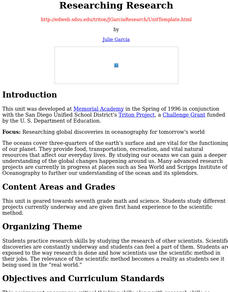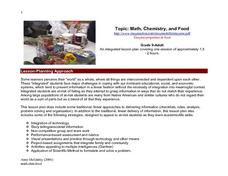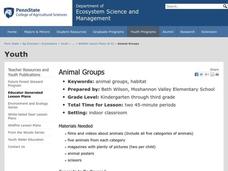Curated OER
Food Webs in a Pond
Students explore food chains and food webs in a pond and identify common creatures found in ponds. They look for tadpoles, fish, mites and other creatures in a pond during a field trip for first hand research.
Curated OER
One Square Meter
Learners examine various ecosystems using scientific inquiry. Using the local area, they assess the characteristics and conditions in one square meter. They report their findings in the form of a survey map and data sheet. They...
Curated OER
Good Heavens
Students look at the history of science to identify some of the scientific ideas that different cultures have contributed to science throughout history. They describe using examples ideas developed by different cultures to explain the...
Teach Engineering
Sugar Spill!
Sugar isn't good for you, but it's great for yeast! Scholars design an experiment to investigate how variables affect the rate of sugar consumption in yeast. The last installment of a nine-part Life Science unit considers how scientists...
Curated OER
Everything's Under Control
Fifth graders prepare for a "Mad Scientists Fair" by creating a controlled study and by conducting experiments. They make and record observations and classify specimens according to characteristics. They compare results to their original...
Curated OER
The Battle of Stones River: The Soldiers' Story
Learners organize items in a "doohickey kit" distributed by the teachers, creating categories using classification schemes. In this classification activity, learners compare systems within groups and write questions that could be...
Curated OER
Will Biotech Crops Solve World Problems?
Pupils read an online article to examine what biotechnology and agricultural biotechnology are. They answer questions and complete worksheets based on the article's information.
Curated OER
Hare vs. the Tortoise
Seventh graders identify and create questions and hypotheses, dependent and independent variables and form a conclusion that can be answered and tested through scientific experimental investigation. In this relationship lesson, 7th...
Curated OER
Researching Researchers
Seventh graders use accessible technology to explore active research projects currently taking place, choose a current research project to study and create a presentation using the information that they have gathered.
Curated OER
Linnaeus' Latin Lingo
Students use Latin and Greek words to figure out species names for whales.
Curated OER
Red River of the North Flooding 1997
Learners describe factors that affect the flow of rivers and explain their relationships. They research the factors involved in flooding events. describe the effects of present and future practices in land use, and river control methods.
Curated OER
Topic: Math, Chemistry, and Food
Students listen as the teacher tells the story of Sisyphus rolling the stone up the mountain. Students prepare two batches of jello, one with fresh pineapple, and one with canned pineapple. While the jello is setting, students work on...
Curated OER
Great Questions for Tic Tac Toe
Fourth graders plan their own activities to reinforce the concepts being taught in school. The tic-tac-toe grid is used to help students create innovative learning activities to generate ideas.
Center Science Education
Investigating the Climate
What do graphs of atmospheric gases over time show us? Do they indicate that carbon sources and carbon sinks are not in balance? Up-and-coming meteorologists watch video clips, read information, and analyze data from the HIPPO (HIAPER...
Curated OER
Back to the Past
What was the Untied States like in 1938? What were the concerns of Americans in the post World War I era? What were their fears? What were their sources of news and entertainment? To understand the reaction to Orson Welles' radio...
Curated OER
U.S. History: de Soto's Alternate Route
Eighth graders examine various maps associated with Hernando de Soto's expedition. By comparing their textbook maps with newer maps, they answer a battery of focus questions. Using Microsoft Word, 8th graders answer the questions...
Curated OER
Village Research
Sixth graders research global warming. In this science lesson, 6th graders collect data in the Waterton Townsite, Apgar Village and St. Mary area. Students interpret the data and form a hypothesis about global warming.
Curated OER
Classifying Living Things
Learners identify how to classify living things. They classify various concepts including family members, kinds of clothing, numbers, shapes, and vocabulary words. They discuss how to classify various concepts and classify pictures of...
Curated OER
Food Web Chasey
Students work together to review the concepts of food webs and food chains. They describe the role of plants and animals when dealing with the cycling of energy. They identify any behavioural strategies to help the animals survive.
Curated OER
Model Rockets
Learners study the basics of a model rocket and its classifications. In this rocket lesson students determine the flight duration of a model rocket.
Curated OER
Ten Important Hardwoods
Students discuss ten important Pennsylvania hardwood trees, examine characteristics of each tree species, evaluate economic and ecological importance of hardwood trees, and recognize at least two characteristics of each species.
Curated OER
Protecting Habitats and Species
Students recognize that scientists continuously gather and interpret data to understand and predict relationships among natural phenomena. They research various volcanoes and plot the volcano locations on a world map.
Curated OER
Animal Groups
Students explore animal groups. In this animal science lesson, students use pictures from magazines and classify the animals into five categories. Students share why they categorized the animals the way they did.
Curated OER
Detection Detective
Young scholars describe what each detection method uses and rank the wavelengths of each if appropriate. They answer questions about absorption, importance of materials and explain differences. Students make sure they describe diagnostic...

























